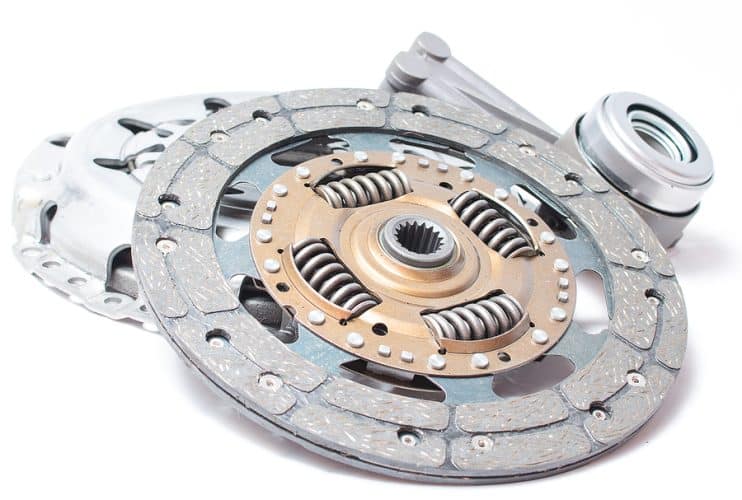
Unless you drive an automatic vehicle, you’ll know exactly how it should feel when you put your foot on the clutch pedal to shift gears. You’ll know if it doesn’t feel right, from a lack of pressure to grinding or even unusual engine noises.
One factor that can cause issues with the clutch is a small component called the clutch slave cylinder, a crucial part of the transmission system.
If something goes wrong with either of your clutch cylinders, you might notice changes in clutch pedal feel or height, grinding or difficulty when trying to shift, leak of clutch fluid, and problems with the clutch engagement.
We’ll talk you through why the clutch slave cylinder might be failing, some of the most common signs that there’s a problem and how best to have it repaired or replaced with a new or used clutch slave cylinder. Catching problems early on can save you bigger headaches down the road.
Table of contents:
- What is a clutch slave cylinder, and what does it do?
- What causes the clutch slave cylinder to fail?
- So, what are the symptoms of a faulty clutch slave cylinder?
- Where can I find the slave cylinder?
- What’s the difference between the slave cylinder and the master cylinder?
- How to repair a faulty clutch slave cylinder?
- How much does it cost to replace a clutch slave cylinder?
What is a clutch slave cylinder, and what does it do?
The clutch slave cylinder works with the clutch master cylinder, allowing your vehicle to change gears smoothly. Both are essential components. After the clutch master cylinder converts pedal pressure into hydraulic force to release the clutch, the slave cylinder re-engages the clutch to shift you into whatever gear you’re switching to.
Despite being a tiny part of the overall system, the clutch slave cylinder plays a vital role. So when something goes wrong with it, you’ll notice.
What causes the clutch slave cylinder to fail?
Over time, many things can make this small but important clutch component wear out and stop doing its job, but other reasons exist. Here are some of the most common:
- Contaminated fluid: Probably the most common cause of a dodgy slave cylinder. Tiny bits of dirt and contamination in the brake/clutch fluid can ruin the smooth interior surfaces of the cylinder, where everything needs to seal and slide correctly.
- Wear and tear: Over time, the slave cylinder wears out from repeated use, like most car parts. The seals and moving pieces inside break down and stop working properly after so many years.
- Improper bleeding: If the fluid system has a lot of bubbles because someone didn’t bleed it right, those air bubbles make it hard for the fluid to work the way it should to operate the slave cylinder.
- Overuse of the clutch: Drivers can be hard on the clutch and make parts wear out faster too. If you’re always riding the clutch pedal partway down or slipping the clutch a lot when you drive, that can overheat components and cause problems.
- Manufacturing defect: Sometimes the factory just makes a bad slave cylinder from the beginning because of problems with materials, dimensions or quality control. So manufacturing defects can also make the part fail quicker.
So, what are the symptoms of a faulty clutch slave cylinder?
Here are some of the most common signs that your slave cylinder might be failing:
A soft clutch pedal
A spongy, loose-feeling clutch pedal that sinks to the floor, is slow to reset, or is difficult to push down may mean your clutch slave cylinder has a problem. If there’s a problem with the slave cylinder, it won’t push hard enough to re-engage the clutch.
This soft pedal feel will get progressively worse over time and you may also notice spongy or intermittent pressure when you push down or release the clutch pedal.
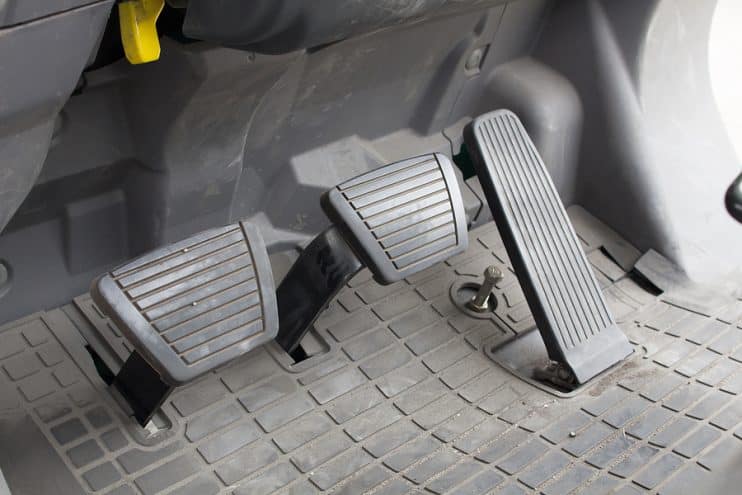
Leaks
Finding clutch fluid puddles underneath your vehicle is a clear sign of a leak. The high-pressure cylinder has intricate seals. Once these fail, fluid will leak out rapidly. If the problem isn’t fixed, all the fluid can leak out, causing complete clutch failure and difficulty stopping (since the clutch fluid reservoir is shared with the brake master cylinder).
Low brake or transmission fluid
If you notice the brake fluid reservoir is low, this can also be a sign of a leak in the clutch system. The clutch slave cylinder and brake master cylinder share the same fluid reservoir, so a leak on the clutch side will lower the brake fluid levels.
Topping up the fluid without fixing the underlying issue will lead to chronic low fluid levels and eventually even brake or clutch failure.
Difficulty shifting gears
Difficult shifts are a sign that there’s a problem with the clutch fully engaging and disengaging. With clutch fluid leaks or failure of the slave cylinder seals, the pressure in the transmission system gets compromised and the clutch pedal can’t work properly.
A squeaking or grinding noise from the gears
When you press down on the clutch pedal, it should operate quietly. However, if you start hearing grinding or squeaking noises, it could signal an issue with the clutch slave cylinder.
These noises may occur if there’s a leak causing a decrease in oil levels or if components aren’t moving as they should and need more force. For example, If there’s only partial clutch plate contact, you might notice grinding when you shift gears.
Unusual engine noises
If you notice a loud noise when pressing the clutch pedal while the car is in gear, it might suggest a leak in one of the clutch cylinders. This could prevent the release fork from staying in place securely or properly disengaging the clutch.
Experiencing multiple symptoms like this often points to a faulty clutch slave cylinder but it’s worth knowing that issues with the clutch master cylinder can also cause similar problems. To pinpoint the exact problem, get advice from a reliable mechanic. If the master cylinder fails, the situation can get rapidly worse and usually needs immediate attention.

Where can I find the slave cylinder?
It’s usually found either inside or outside the transmission, depending on the type of system your vehicle has. In a semi-hydraulic system it’s located outside the transmission and can be easily accessed for maintenance. However, in some systems, it’s inside the transmission, needing more effort to reach because you may need to remove the transmission to access it.
What’s the difference between the slave cylinder and the master cylinder?
The clutch slave cylinder and the clutch master cylinder are both vital for operating the clutch, but they serve different roles. The master cylinder transforms mechanical pressure into hydraulic pressure, releasing the clutch plate. On the other hand, the slave cylinder applies pressure to return the pressure plate when there’s no hydraulic pressure. So they work in opposition to each other to enable smooth gear shifts. If one of these components malfunctions, your vehicle’s gear shifting will be affected.
How to repair a faulty clutch slave cylinder?
If you know your way around a transmission system and are confident you can fix the problem, you could save some money and repair the slave cylinder yourself. But it can be a complicated job, so most drivers will leave it to a trusted mechanic.
How much does it cost to replace a clutch slave cylinder?
The cost of replacing a clutch slave cylinder and changing the clutch fluid is around £100 to £200, so it’s not a hugely expensive job to leave to the professionals. However, some makes and models may cost more.

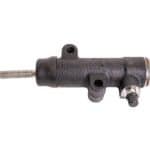
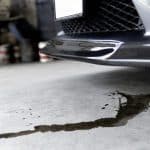

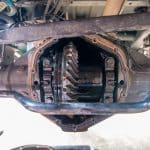
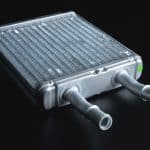
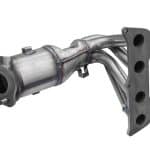


.png)